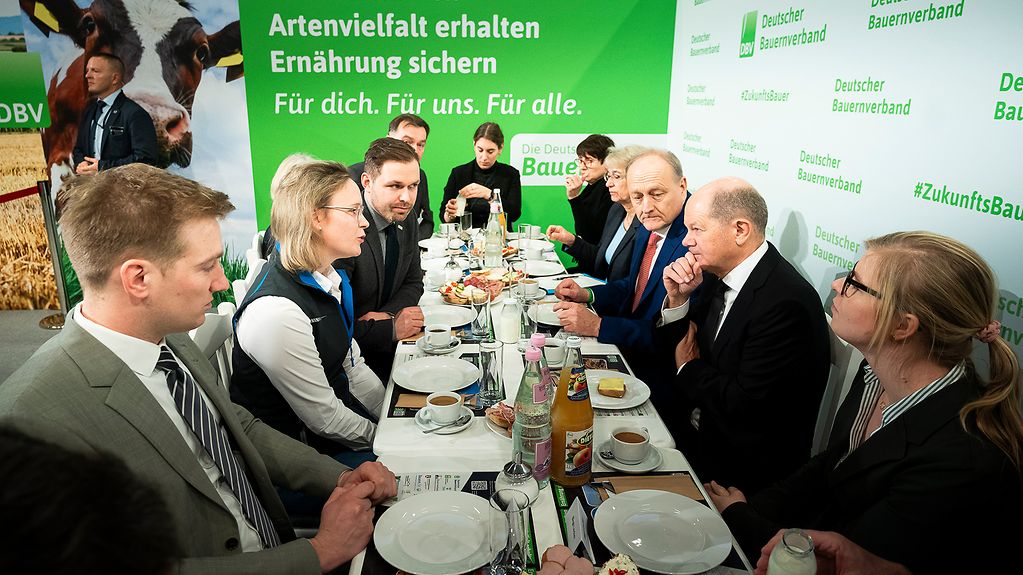Federal Chancellor attends International Green Week
The Green Week gave the Federal Chancellor an insight into productivity and innovation in agriculture, forestry and food production. He wants to take a collaborative approach to the huge challenges facing agriculture.
3 min reading time

Federal Chancellor Scholz talks to young farmers at Green Week in Berlin.
Photo: Federal Government/Kugler
On a tour of the International Green Week, Federal Chancellor Olaf Scholz gained an impression of the diversity of agriculture, forestry and food production. His visit included conversations with young farmers, dropping in at a show kitchen and bakery, and listening to presentations on intact forests and marshlands, wooden construction, and the use of drones and robots in agriculture.
The programme also included meetings with Joachim Rukwied, President of the German Farmers' Association, and Christoph Minhoff, Managing Director of the Federation of German Food and Drink Industries.
Tackling challenges together
“Commercially viable agriculture is vital, now and in future,” said the Federal Chancellor after touring the trade show. Scholz called for every effort to be made to ensure that agriculture remains part of our economy in future.
The Federal Government understands the complex challenges currently facing agriculture. These include producing food which is good quality, affordable and sustainable, protecting nature and caring for the landscape. Farmers also have to deal with the impacts of climate change as droughts and serious flooding are causing them problems. In addition to this, agriculture faces pressure due to the market power of major food companies and demands from many consumers for better animal welfare. More food is expected to come from organic farming in future.
The Federal Chancellor called for caution in addressing these major changes, “never losing sight of what is feasible.” He stressed that all who work in agriculture can rely on that.
In a conversation with young farmers, the Federal Chancellor said how impressed he was at the passion shown by these young skilled workers in looking after their farms. This was grounds for optimism, Scholz said. It was agreed that the conversation would be continued.
Maintaining dialogue
Scholz said the Federal Government also wants to find opportunities for dialogue with farmers and for talking to them about the “pragmatic things we can do to make it easier for these companies to do business and to facilitate a commercially viable future for them.”
With regard to clearing away bureaucracy, he reassured farmers that the Federal Government aimed to make life easier for them by changing rules which can be shaped in Germany, along with those regulations which are rather more difficult to influence in Brussels.
Between now and the summer break, the Federal Government aims to hold talks with the agricultural industry to develop plans for sustainable support for the sector. The goal is to achieve tangible improvements for farmers. A comprehensive package is to be put together, including clearing away unnecessary bureaucratic hurdles and providing funding for converting agricultural buildings.
The International Green Week is taking place in Berlin until 28 January. It is the world’s largest trade fair for food, agriculture and gardening, with 1,400 exhibitors from 61 countries. The Federal Government is represented by the Federal Ministry of Agriculture, the Federal Ministry for Economic Cooperation and Development, and the Federal Ministry for the Environment. The Global Forum for Food and Agriculture marked the political opening of the event.